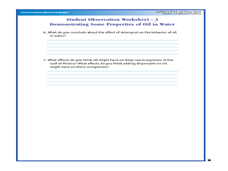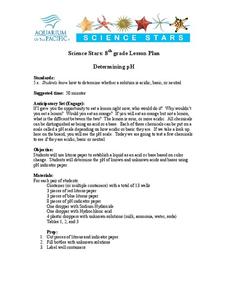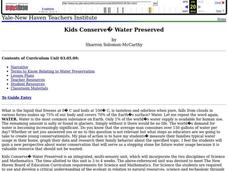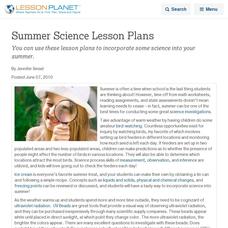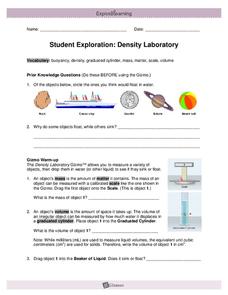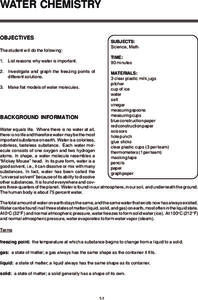Curated OER
Watch Me Grow
Learners observe that plants need air, food, light, and water to survive. In this plant biology lesson, students observe the growth and development of two plants, one is the control plant and the other is denied either air, water, or...
Curated OER
Oil Floats, Right?
Young scholars examine the properties in oil in water. In this mixture lesson, students read about the Lophelia II 2010: Cold Seeps and Deep Reef Expedition and look at images of deep sea ecosystems. They experiment or participate in...
Curated OER
Osmosis and Diffusion: Egg Lab
Students examine why diffusion and osmosis happen in an egg cell. In this diffusion lesson students demonstrate a semi permeable membrane.
Curated OER
Growing A Coral Skeleton
Learners research the growth of coral. In this coral polyps lesson, students simulate the growth of coral by using available materials to grow crystals. Learners record observations in a scientific journal.
Curated OER
Determining pH
Eighth graders explain the difference between acids, bases and neutral solutions. In this chemistry lesson, 8th graders describe the properties of each. They determine the pH of an unknown solution using the indicator paper and pH scale.
Curated OER
The Spectrum of a Star
Tenth graders identify stars based on their line spectra. In this astronomy lesson, 10th graders analyze spectrograph and determine the elements present in the star. They explain the relationship between temperature and star classes.
Curated OER
Kids Conserve? Water Preserved
Students study conservation and how cities obtain their water. In this water instructional activity students view a PowerPoint presentation and draw a picture of the water cycle.
Curated OER
Summer Science Lesson Plans
You can use these lesson plans to incorporate some science into your summer.
Curated OER
Using the Hunter Model and the Holistic Model
Students increase their knowledge of scientific processes in chemistry. They compare and analyze 3 sets of data, they have gathered, for accuracy and precision.
Curated OER
Pioneer Farm Cooking
Students explore pioneer farm life and the types of cooking and ingredients available. They recreate a pioneer version of a sno-cone and discuss why crushed ice was used more often than snow in this recipe.
Curated OER
Household Acids and Bases
Ninth graders complete an experiment to determine the pH values of a variety of common household substances. They use red cabbage to find the indicator colors of the pH range. They complete a data table that includes a prediction and...
Curated OER
Sound
In this physics worksheet, students use the clues given on the bottom of the sheet to complete the crossword puzzle on sound. There are 18 clues to solve in the puzzle.
Curated OER
The Stock Market: High School Economics
High school economists learn about the stock market in a project where they "buy" and track stocks. The author of this resource reports it is the high point of her 12th grade economics course, but no resources are attached. After viewing...
Curated OER
How to Cook Rice
Fourth graders discover how to cook rice. In this cooking instructional activity, 4th graders discover how to cook rice correctly. Students read and follow cooking directions and discuss how their rice turned out.
Curated OER
What is pH and Why is it Important?
Students investigate acids, bases, and pH, and related this knowledge to the problem of acid deposition.
Curated OER
Surface Tension and 3D Soap Films
Students are introduced to the concept of surface tension, its dependence on material composition, and how it can produce uniquely shaped surfaces.
Curated OER
Metric Units of Volume
In this metric units of volume worksheet, students read about meters, milliliters, and deciliters prior to responding to 2 multi-step metric problems.
Curated OER
Friction Faction
Students create an experiment. In this friction lesson plan, students review the concept of friction and complete a bottle roll activity. Students work in groups to create their own friction experiment.
Curated OER
Student Exploration: Density Laboratory
In this density laboratory instructional activity, learners complete 2 prior knowledge questions, then use the "Density Laboratory Gizmo" to complete several activities, answering short answer questions when finished.
Curated OER
Models and Algorithms to Solve Multiplication Problems
Students choose the correct strategy to solve multiplication and division. In this algorithm lesson, students use at least two strategies that use properties of operations and estimation. Students also recognize the relationship between...
Curated OER
WATER CHEMISTRY
Students list reasons why water is important and investigate and graph the freezing points of different solutions.
Curated OER
Figuring Elapsed Time
Students discover the concept of elapsed time. For this calculating time lesson, students utilize the Internet to complete record sheets based on the concept of elapsed time. Finally, the students answer questions on their own.
Curated OER
Changes in Matter
Eighth graders, in groups, explain the difference between physical and chemical changes.
Curated OER
Changes In Matter, "The Big Chill"
Third graders investigate why ice cream does not go through any chemical changes when it is exposed to physical changes. They describe the three states of matter in either written or verbal form. Then students experiment with ice cream...
Other popular searches
- Liquid Measurement Chart G
- Liquid Measurement Chart
- Volume Liquid Measurement
- Liquid Measurement Activity
- Standard Liquid Measurement
- Liquid Measurement Tools
- Liquid Measurement in Math
- Metric Liquid Measurement
- Liquid Measurement Chart G"4
- Liquid Measurement Worksheet
- Using Liquid Measurement
- Liquid Measurement Gill



